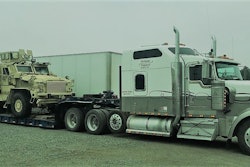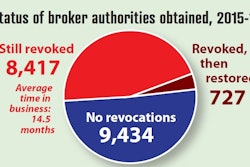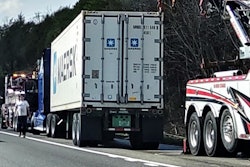Last month, the Federal Motor Carrier Safety Administration asked for input from the trucking industry to help guide the agency in developing future guidance on the definitions of “broker” and “bona fide agents,” as required by the Infrastructure Investment and Jobs Act (IIJA), legislation passed last year by Congress and signed into law by President Biden.
FMCSA asked respondents to answer 13 specific questions related to brokers, bona fide agents, dispatch services and more. During the month the comment period was open, the agency received 92 comments from a variety of groups and individuals, including trucking groups, brokerage groups and individual brokers and carriers.
One of the biggest topics of discussion among commenters was the definition of “dispatch services” and the role they play in trucking -- and whether they should be required to obtain broker operating authority.
The Owner-Operator Independent Drivers Association in its comments said that can depend on what the dispatch service is actually doing for the carrier. OOIDA said in general, if an intermediary is handling money between the shipper and the motor carrier, then the intermediary is conducting a brokered transaction and should have broker operating authority. However, if an intermediary is not directly handing money between a shipper and carrier, they should not be considered a broker.

“If the dispatch service is in party to the contract between the shipper and the carrier or plays a financial role directly between the shipper and the carrier, then they should need to obtain broker operating authority,” OOIDA said. “If the dispatch service holds themselves out as a contractor, and a carrier can hire them to work for them as part of their normal organization by signing an agreement with a continuing relationship whereby the carrier directs the duties of the dispatch service, then they should not need to obtain broker operating authority.”
The Transportation Intermediaries Association group, representing brokers and freight forwarders, said there is currently a “dangerous loophole” in FMCSA’s regulations for companies who operate as dispatch services for more than one motor carrier.
“Many such services are illegally operating as unlicensed brokers,” TIA said. “These services handle freight payments but do not meet the statutory licensing or financial security requirements otherwise applicable to brokers.”
[Related: ‘You just lose’ when middlemen don’t pay: Broker reform eight years in the waiting]
The group added that a legal dispatch service works on behalf of one motor carrier, where the dispatch service assists in booking loads and other services for a single carrier. These companies, TIA said, are then paid a commission for their services -- a vastly different model from brokers, in which a shipper pays a broker for the broker’s service, and the broker pays the carrier.
“TIA is confident that many dispatch services are exploiting a degree of ambiguity in the current definitions of brokers vis-a-vis dispatch services and, as such, are operating unlawfully as unlicensed brokers. FMCSA should clarify the distinction between brokers and dispatch services and prohibit these companies from offering such a service without a broker’s license."
Load One LLC, a 450-truck Michigan-based fleet, did not mince words when it comes to dispatch services in its comments. “’Dispatch services’ are brokers by all means and are skirting the rules, regulations and insurance and liability requirements,” the company said. “Individuals on social media [are] offering classes for a few hundred dollars to start your own dispatch service in days. It is illegal and needs to be clamped down ASAP.”
Dispatch service Seeley and Sylvester Freight Logistics in its comments provided information on how dispatch services differ from brokers in their business models. The company said dispatch services “do not connect shippers who need to move their commodities with carriers that can transport them, therefore do not meet the criteria that matches the broker business model. Dispatch services are also ‘known’ for booking loads, however, besides scheduling truck movements, the model is completely different in every aspect.”
Seeley and Sylvester Freight added that dispatch services do not, “under any circumstances,” possess any money between carriers and shippers or brokers. “The possession of money between shippers and motor carriers is a role outside of the scope of dispatch services' business model,” the company said. “Dispatch companies can help motor carriers prepare all documents needed to submit for payment, but they don't handle any money.”
[Related: Yet another hand in the cookie jar: Counterpoints on independent dispatch]
When it comes to determining whether a dispatch service should be required to obtain broker authority, Seeley and Sylvester said FMCSA should consider whether the dispatch service is working on behalf of shippers directly and arranging freight to be moved by carriers, or working on behalf of carriers to book loads being offered by brokers.
“An authority should not be required, even when acting on behalf of multiple carriers, unless they are arranging transportation for freight directly on behalf of shippers,” the company said. “An independent dispatcher is truly an independent contractor working on behalf of the carrier.”
Frank Donovan, owner of independent dispatch service Quality Dispatching Services, said dispatch services are hired by owner-operators to be a “bona fide agent” working under the carrier’s authority to locate freight from brokers or shippers on behalf of the owner-operator.
Donovan concluded that brokers are not dispatchers, and dispatchers are not brokers: “Forcing the same financial and regulatory requirements for freight brokers onto independent dispatchers is counterintuitive and will place an additional financial burden on our owner-operators at a time when we should be supporting the hard-working truckers across the United States of America.”
Yet TIA argued that dispatch services can only be classified as bona fide agents if they are acting exclusively on behalf of one motor carrier. That's one reason various stakeholders have argued for a new definition within regulatory language recognizing the role dispatch services play, given most work for multiple motor carriers.
[Related: Time to account for independent dispatch services in regulation?]
But both OOIDA and TIA said FMCSA should use the current definition of “broker” to ultimately determine whether dispatch services need broker authority or not. That definition generally offers clear criteria for what constitutes a broker. OOIDA also noted that it’s not the definition that’s the problem, but rather how the businesses themselves operate.
OOIDA argued that many carriers’ complaints about brokers are that the existing regulations are not properly enforced. The group asked FMCSA to update its broker transparency regulations to ensure carriers have access to transactional information.
Additionally, OOIDA asked FMCSA to move forward with the 2018 “Broker and Freight Forwarder Financial Responsibility” rulemaking, previously issued in an advanced-notice form. The rule would allow FMCSA to immediately suspend the registration of a broker if the available financial security (whether bond or trust) fell below the current $75,000 required minimum. Such a change might help combat the well-known "hit and move on" scam by various bad actors, establishing brokerages only to move load-board-acquired freight with no intention to ever pay a single carrier, before disappearing with little consequence.
[Related: Critics say trust fund surety fails to protect truckers in claims against brokers]









